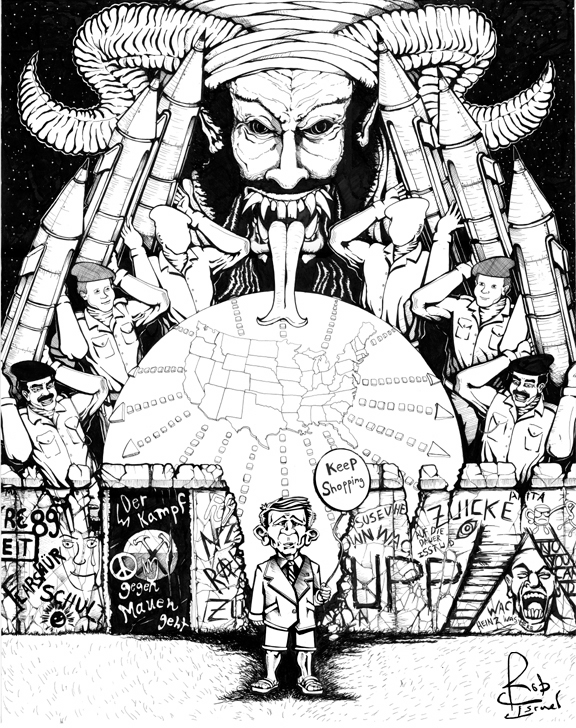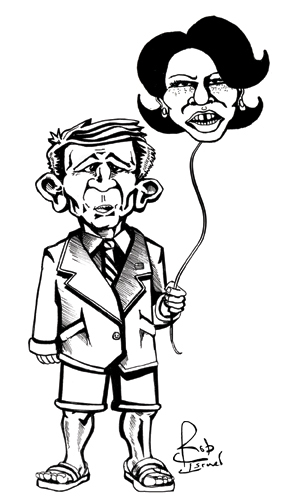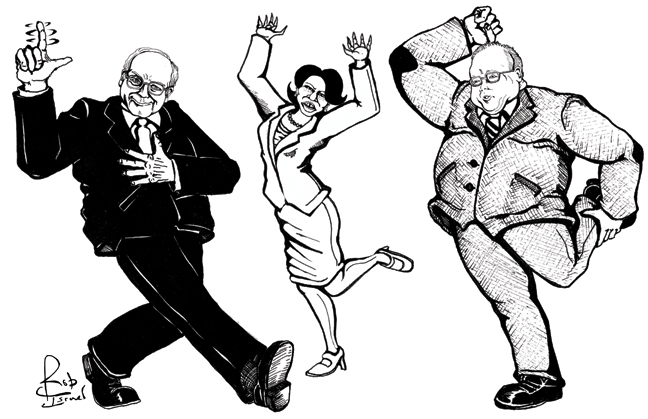
Every halfway decent president since Harry S. Truman has had some sort of presidential “doctrine.” By this we mean the contours, outlines, and ways and means of his particular presidency. For instance, Truman, the first Cold War president, developed in conjunction with his Administration the idea of “containment.” And Ronald Reagan, four decades later, applied the idea of “rollback.” The first sought to contain the spread of communism, and the second sought to rollback the forces of communism. We now have a new doctrine in town; its author is Dum’ Dum and its headline is “pre-emption”—strike our enemies before they strike us, cowboy style!
Dum’ Dum’s “National Security Strategy of the United States of America” enshrines preemption as official policy [2]. But analyses of this and other documents reveal that Dum’ Dum’s preemption is really about something else: U.S. Expansionism. We were attacked on 9/11 and our vulnerability was exposed. We must now recuperate our façade of invincibility and absolute security. To do this we must expand our American power beyond challenge. And why not? Is not our system the best, brightest, and most beautiful? Does not the world aspire to be American? Expansionism presumably insures our safety and grants the world access to our way of life. This does make sense. There is less chance of foreign attack as the world becomes more American. It’s a long shot, but hey, it’s worth the old college try.
But the Dum’ Dum doctrine is more than a political policy; it is also, and more definitively, a social, cultural, and historical overhaul. The twenty-first century has begun with the events of 9/11 and Dum’ Dum’s global war on terror. Our unique historical situation begs and demands that we expand our pluralistic, liberty-giving ways. Mushroom Cloud Condi, Dum’ Dum’s current Secretary of State, articulates the point:
[A]n earthquake of the magnitude of 9/11 can shift the tectonic plates of international politics. The international system has been in flux since the collapse of Soviet power. Now it is possible--indeed, probable--that that transition is coming to an end.
If that is right, if the collapse of the Soviet Union and 9/11 bookend a major shift in international politics, then this is a period not just of grave danger, but of enormous opportunity. Before the clay is dry again, America and our friends and our allies must move decisively to take advantage of these new opportunities. This is, then, a period akin to 1945 to 1947, when American leadership expanded the number of free and democratic states--Japan and Germany among the great powers--to create a new balance that favored freedom [3].
Mushroom Cloud Condi hits the nail on the head. This new century is an opportunity for America to create a unilateral world in which one nation, and one nation only, calls the shots. Understanding Dum’ Dum’s doctrine and its socio-historical overhaul necessitate certain analyses and articulations. That’s the purpose of this essay.
First, we cover the elusive but simple parameters of terrorism and our global war. Second, we cover the post-9/11 domestic front in three parts: numbness, duplicity, and obedience and defense. Third, we cover three different but interconnected histories of American global power: the rise and fall of the Cold War, the golden age of globalization, and the birth of Osama bin Laden. Last, we take a quick look at the wonderful quagmire, “Operation Iraqi Freedom,” and briefly discuss the possibility of discursive activism. And if you’re wondering how Dum’ Dum keeps track of all these threats, changes, and overhauls, don’t worry. The balloon says it all: “I’m a baseball fan, I want a scorecard.... And I actually got a chart. There’s an ‘X’ right there” [4]. Ah, the leadership and ingenuity of our twenty-first century president, Dum’ Dum—a keen doctrinaire.
Terrorism and the War: Elusive and Simple
 The events of 9/11 shook our core; there’s no doubting that. Some of us cried that morning, most of us grieved for a while, and everyone for at least a moment stood still with silent disbelief. But our inertia soon passed, it had too; we knew that war stood at the horizon. We did not quite know the specific parameters of the war, and even today, a few years later, we gasp for more concrete details. But this is all part of the plan. Dum’ Dum and company never officially declared war against the terrorists. Yes, we are no doubt fighting a global war, but we neither inked nor walked through the official channels of war declaration. No matter, though. Dum’ Dum knows that we can do whatever we want. As Madeline Albright, Secretary of State during Bill Clinton’s second term, once said: “If we have to use force, it is because we are America. We are the indispensable nation. We stand tall. We see farther into the future” [5]. Dum’ Dum, while no fan of Albright or the sexually perverted Clinton, understands the sentiment. Who can dissuade us from unleashing war upon these viscous barbarians? Who can stop us from pursuing our global task? Yeah, good luck!
The events of 9/11 shook our core; there’s no doubting that. Some of us cried that morning, most of us grieved for a while, and everyone for at least a moment stood still with silent disbelief. But our inertia soon passed, it had too; we knew that war stood at the horizon. We did not quite know the specific parameters of the war, and even today, a few years later, we gasp for more concrete details. But this is all part of the plan. Dum’ Dum and company never officially declared war against the terrorists. Yes, we are no doubt fighting a global war, but we neither inked nor walked through the official channels of war declaration. No matter, though. Dum’ Dum knows that we can do whatever we want. As Madeline Albright, Secretary of State during Bill Clinton’s second term, once said: “If we have to use force, it is because we are America. We are the indispensable nation. We stand tall. We see farther into the future” [5]. Dum’ Dum, while no fan of Albright or the sexually perverted Clinton, understands the sentiment. Who can dissuade us from unleashing war upon these viscous barbarians? Who can stop us from pursuing our global task? Yeah, good luck!
Some critics argue that not declaring war allows us to avoid international laws and regulations like the Geneva Conventions [6]. Come on, regulate war? That’s almost as bad as regulating the economy. “No thanks,” says Dum’ Dum’s balloon. Let the chips fall where they may. Besides, our current situation doesn’t let us “declare war,” right? Think about it: A war of infinite reach and indefinite scope lasting as long as it needs to cannot be fully understood or completely pre-arranged. We can’t “officialize” war on an abstract, amorphous, rarely seen and ever-present enemy. Duh! It’s like the war on drugs or the war on poverty. What do “drugs” and “poverty” mean, really? Who gets to decide the definitions and applications? When does it begin and when does it end? Who wins and loses, and how do we know? What are the criteria? Are objective criteria even possible [7]? The confusion and lack of answers point to only one concrete, dependable fact: It is all selective prejudice [8]. Dum’ Dum not only realizes but fully embraces this. And let’s praise him for that!
The war on terror, like that of drugs and poverty, is an abstraction that allows us to mobilize and maneuver whatever social forces we deem necessary in whatever direction we see fit. It’s all about the wiggle room. And Dum’ Dum knows how to wiggle. It’s the old Texas two-step, if you will. The Commander-in-Chief commands according to his own discretions, or course. But he needs some space to think, experiment, hypothesize and theorize, make mistakes and recoup. The “war on terror” grants that space. Hell, it’s not the war on terror; it’s the Terror Wiggle!† Sure, Dum’ Dum and his Administration don’t make all the decisions. Congress, the CIA, FBI, etc., have some say. But that’s old school thought. Centralization is key to the new American century. Get on board folks, we’re taking a magic wiggle ride through the next one hundred years of American-led freedom, freedom, and even more freedom.


The definition of terrorism is just as elusive as the war itself. The FBI, Department of Defense, and State Department each have a unique definition. Not to mention, also, the United Nations, the British government, and just about every other government [9]. This further justifies why we didn’t officially declare war. A war on what? If we can’t declare what we’re at war with, then we can’t declare war. As the famous saying goes, one nation’s “terrorist” is another nation’s “freedom fighter.” In fact, back in the 1980’s during Reagan’s presidency, we called Osama bin Laden a freedom fighter as he helped fight back the Soviets from Afghanistan. We’ll examine this at different points below, but for now, the example demonstrates the selectivity of the term and phenomenon: Terrorism is what we say it is, and terrorists are who we say they are.
Dum’ Dum, being the brilliant caricature that he is, knows that language constitutes consciousness. Language shapes, crafts, and steers our understanding of the thing in question. We see the person or thing through its attached term. Putting the label “terrorist” upon persons or groups brands them indefinitely. Except of course when we lift that label. They then become something else (allies, friends, members of the Coalition of the Willing, compatriots, partners in the war on terror, etc). And of course this can change again. Maybe you were an ally, but now you’re a terrorist, and a month from now you’ll once again be an ally.
Take a look here:
Syria = terrorist
Libya used to = terrorist, but now = ally
Pakistan used to = terrorist, but now = ally
Egypt (which has a horrid human rights record) = ally
Palestine = terrorist
Israel = ally
Fidel Castro = terrorist
Anti-Castro contingent in Miami = ally
Hugo Chavez, democratically elected President of Venezuela = terrorist
The Venezuelan “opposition” comprised of wealthy business people = ally
Colombia’s the FARC = terrorist
Colombia’s Government = ally
North Korea kind of but not really = terrorist, but really = “rogue nation”
Iran = terrorist, but really = rogue nation of terrorists
Saudi Arabia, of which certain sectors funded bin Laden’s al Qaeda = ally
Osama bin Laden used to = ally, but now absolutely = terrorist
Saddam Hussein used to = ally, but now = captured and fallen dictator who supposedly harbored and aided terrorists
Chechnya = terrorist to Russia, but really, to the United States = who cares
France = ally (but they’re sketchy, since they didn’t support the Iraq war)
Arab Muslim men who look American = ally
Arab Muslin men who look Middle Eastern = terrorist
Etc....
The list goes on and on, and shall we say, “flip-flops,” continuously. This selectivity boils down to who supports the American way. We need to watch out for ours and our own. That’s the law of the land and part of human nature. The notion of self-preservation runs rampant throughout our nation’s founding documents and helps sustain our free market society. So there’s really no need to go changing that philosophy now. If it ain’t broke, don’t fix it. And international forces need to realize that, too. If they want to preserve their own way of life, then they need to take heed. We’re the indispensable nation. The world falls apart without us. Our wants and needs are primary; we are primordial to the maintenance of the world. Basically, you’re a terrorist if you screw us or our interests. So don’t even think about it. Do what we say, be-yatch! The sooner other countries realize this, the sooner other countries make it to the ally list. It’s really not that sophisticated.
However, the battle over the official definition of terrorism is sophisticated. Things like “the calculated use of unlawful violence to inculcate fear” blah, blah, blah. Or “premeditated, politically motivated violence perpetrated against” whatever. Or “the unlawful use of force and violence against persons or property to intimidate” yadda, yadda, yadda. These federal agencies are paid hundreds of thousands of tax payer dollars to come up with inflated jargon. Hogwash. The buck—your buck—stops here. The brilliance of Dum’ Dum again shows itself: Evildoers. That’s it. It’s to the point and nothing fancy. Terrorism is defined as evil done by evildoers for the purposes of doing evil. What’s hard about that?
This line of logic “naturally” extends from the tragedy of September 11th. The attacks of 9/11 were acts of evil. If they weren’t, then evil doesn’t exist. But we agree that it was evil. Thus, we were attacked by evil. And if we were attacked by evil, we must be good. Anyone who questions our goodness or the attacker’s evil must be sympathetic to the attackers and their evil ways. Furthermore, only evil forces would fail to see (1) the moral divide between the two sides, and (2) the moral imperative of our global war on terror—which is a war on evil. See, Dum’ Dum isn’t stupid; he’s a masterful rhetorician constituting America’s wartime consciousness.
It’s obvious that terrorism as evil must be stopped. That duty has befallen upon us since we were attacked. If you are evil or harbor evildoers, we’re coming after you. Hence, Dum’ Dum’s post-9/11 framing for all things to come: you are either with us or you are with the terrorists. Dum’ Dum secured this understanding from the get-go, and we should thank him for that. He knows how to get buck-nutty with those dirty little cave-dwelling terrorists.
Dum’ Dum also knows to keep things simple. He’s responsible for maintaining the everyday face of post-9/11 American life and soothing our worries. We can’t be thinking too deeply about the situation or get caught up in all the technical hoopla. We need to let the proper authorities take care of it; that’s what democracy is all about. We elect and they govern. Expand our great country, Mr. President. You’re the best, Dum’ Dum! Besides, we’ve got Mel Gibson flicks to watch. We’ll catch up on worldly affairs between the commercials. That’s the purpose of those three-word news scrolls. All the information we need in three words or less.
« previous | next »

